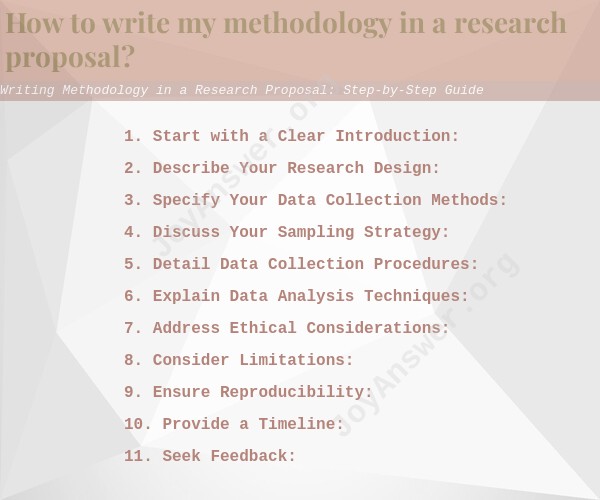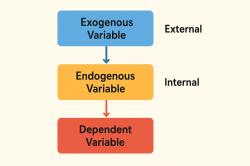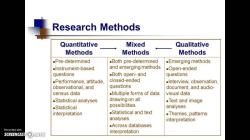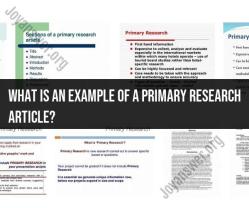How to write my methodology in a research proposal?
Writing the methodology section of a research proposal is a crucial step as it outlines the approach and techniques you will use to investigate your research question. Here's a step-by-step guide to help you write the methodology section effectively:
1. Start with a Clear Introduction:
- Begin the methodology section with a brief introduction that explains the overall approach you will take in your research. Mention the research methods you will use and why they are suitable for your study.
2. Describe Your Research Design:
- Provide details about your research design, such as whether it's qualitative, quantitative, mixed methods, experimental, or observational. Explain why you chose this specific design and how it aligns with your research goals.
3. Specify Your Data Collection Methods:
- Clearly outline the methods you will use to collect data. This could include surveys, interviews, experiments, observations, document analysis, or a combination of these. Explain why these methods are appropriate for your study.
4. Discuss Your Sampling Strategy:
- Describe how you will select your participants or subjects. Explain your sampling method (e.g., random sampling, purposive sampling) and justify why it is suitable for your research.
5. Detail Data Collection Procedures:
- Provide a step-by-step description of how you will carry out your data collection. Include information about where and when data collection will occur, who will be responsible for data collection, and how you will ensure data accuracy and reliability.
6. Explain Data Analysis Techniques:
- Specify the statistical or analytical techniques you will use to analyze your data. If you are using software or tools for analysis, mention them and justify their selection. Explain how these methods align with your research objectives.
7. Address Ethical Considerations:
- Discuss any ethical considerations related to your research, such as obtaining informed consent from participants, protecting privacy and confidentiality, and addressing potential risks. Explain how you will ensure ethical conduct throughout your study.
8. Consider Limitations:
- Acknowledge the potential limitations of your methodology. Be honest about any constraints or challenges you may encounter during data collection and analysis.
9. Ensure Reproducibility:
- Describe your methodology in enough detail so that another researcher could replicate your study. This enhances the transparency and credibility of your research.
10. Provide a Timeline:- Include a timeline or schedule for your research activities. Outline when you plan to start and complete data collection, analysis, and reporting. This demonstrates your organization and planning skills.
11. Seek Feedback:- Before finalizing your methodology section, seek feedback from your advisor, peers, or colleagues. They can offer valuable insights and suggestions for improvement.
12. Revise and Proofread:- Carefully review and edit your methodology section for clarity, coherence, and grammar. Ensure that it flows logically and is free of errors.
13. Align with Research Objectives:- Continuously ensure that your methodology aligns with your research objectives and research questions. It should be a means to answer your research questions effectively.
14. Use Proper Citation:- If you are adapting or modifying methods from existing research, be sure to provide proper citations and references to acknowledge the sources of your methodology.
Remember that the methodology section is essential because it demonstrates the rigor and validity of your research approach. A well-written methodology will instill confidence in reviewers and readers that your research is well-planned and capable of producing meaningful results.
Methodology in Research Proposals: Crafting a Solid Approach
The methodology section of a research proposal is where you explain how you plan to conduct your research. It is important to craft a solid methodology that is both feasible and appropriate for your research question.
Here are some tips for crafting a solid methodology:
- Define your research question clearly. What are you trying to learn? What specific hypotheses or questions are you testing?
- Identify the appropriate research methods. What methods will best allow you to answer your research question? Consider both qualitative and quantitative methods, as well as mixed methods approaches.
- Describe your data collection and analysis procedures in detail. How will you collect your data? How will you analyze your data? Be specific and thorough in your descriptions.
- Pilot test your methodology, if possible. This will help you to identify any potential problems and to make necessary adjustments before you begin your full-scale study.
Defining Your Methodology: How to Present It in a Research Proposal
When presenting your methodology in your research proposal, be sure to include the following information:
- Research design: What type of research design will you be using? (e.g., experimental, quasi-experimental, correlational, case study, grounded theory, etc.)
- Participants: Who will be participating in your study? How will you recruit participants?
- Data collection: What methods will you use to collect data? (e.g., surveys, interviews, focus groups, observation, archival data, etc.)
- Data analysis: How will you analyze your data? (e.g., statistical analysis, thematic analysis, discourse analysis, etc.)
- Ethical considerations: What ethical considerations will you take into account? (e.g., informed consent, confidentiality, etc.)
Research Methodology Demystified: Writing the Method Section in Your Proposal
Here are some tips for writing the method section of your research proposal:
- Be clear and concise. Avoid using jargon and technical language that your audience may not understand.
- Be specific and detailed. Describe your data collection and analysis procedures in enough detail so that another researcher could replicate your study.
- Be logical. Organize your method section in a logical way, so that it is easy for your reader to follow.
- Be ethical. Be sure to address any ethical considerations that are relevant to your study.
By following these tips, you can write a strong methodology section that will impress your reviewers and help you to secure funding for your research.













